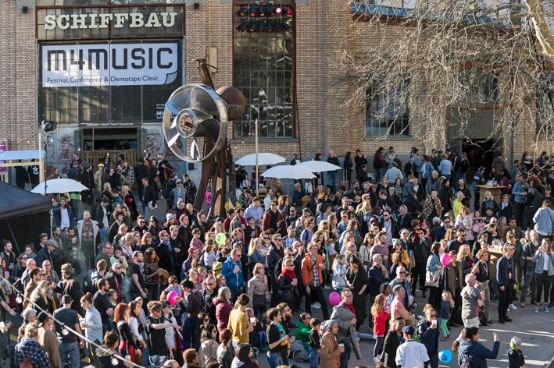The situation is improving - but not everywhere
At its 22nd edition, the m4music festival once again stood out as a concert venue and industry meeting place. While the music set a positive tone, both music journalism and the concert business gave cause for concern.

The numbers were once again impressive: not only around 1000 representatives of the music industry, but also around 6000 fans attended the 22nd edition of the three-day pop music festival m4music in Lausanne and Zurich. While the Zurich folk band Black Sea Dahu and the Winterthur duo, who operate between rock, rap, pop and noise Ikan Hyu were responsible for the musical highlights, the thirty or so events in the conference section discussed topics as diverse as performance opportunities in Europe, the (survival) life of a songwriter and the current sales figures in the music business.
Streaming on the rise
In the panel "The music market 2018, 2019 and beyond", the conclusion was that the situation is improving. Growth is no longer driven by CD sales or downloads, but by the streaming business. Last year, the Swiss recorded music market generated sales of around 170 million Swiss francs - 3.7% more than in the previous year. According to Ivo Sacchi, Managing Director of Universal Music Switzerland, there are music genres that generate up to 95 percent of their recorded music revenue from streaming. "This is particularly true for urban, German rap and hip hop." Marc Lynn, bassist of the rock band Gotthard, painted a slightly different picture: "Rock fans still want to be able to hold the physical product in their hands." He estimated that around 70 percent of fans would still buy Gotthard's music on vinyl or CD. However, this differs from continent to continent. "In South America, it's almost all streaming." Universal representative Sacchi has no doubt that the trend towards streaming will continue, even in Switzerland: "The potential is far from exhausted." The fact that 15,000 songs are uploaded to streaming portals such as Spotify every week speaks for itself.
Music journalism in a crawl
The situation in music journalism, on the other hand, was less pleasing. During the panel on the topic, a certain helplessness emerged. Linus Volkmann, who until last year worked for the now defunct music magazine Intro explained: "Music journalism has lost its gatekeeper function. Accordingly, today's young target groups can do without print products." Nevertheless, or perhaps precisely for this reason, Ane Hebeisen, pop editor at the daily newspaper The Confederationis convinced that music journalism is still necessary - and more so than ever. "We need writers who create depth and open the door to other worlds of music." The fact is, however, that the Tages-Anzeiger has had no budget for freelance music journalists since last year. Volkmann, who is also a book author, was able to take some positives from the decline of music journalism, however: "Anyone who wants to publish about music can now simply do it." For example, by means of a YouTube channel or a blog.
Clubs threatened with extinction
In his keynote speech "Monopoly in the global concert business", independent concert agent Berthold Seliger from Berlin discussed his industry, which was praised as a goldmine just a few years ago. Since 2012, however, large corporations have been steadily gaining influence in this area. While small club operators are trying to build up artists sustainably, giant players such as Live Nation are only interested in business. And with good reason: "One percent of all artists generate 60 percent of all concert revenue," Seliger knew. A fact that led him to call for a state-imposed solidarity levy for independent clubs and promoters. "For every ticket that costs more than 50 euros." This is actually unavoidable because local clubs and event organizers are increasingly becoming a dying breed. Seliger did not believe that the situation would improve on its own.
Urban-rural trench
And how did festival director Philipp Schnyder von Wartensee rate the 22nd edition of this Migros Culture Percentage event? "It was three lively, intensive days with great discoveries of Swiss talent," he said. He was particularly struck by how openly many of the 1000 or so representatives of the national and international music industry approached each other. "The longer you meet each other, the more you don't see each other as competitors, but first and foremost see a wide range of opportunities for collaboration." However, he was more critical of another development: although there is no longer a rift between musicians from German-speaking Switzerland and French-speaking Switzerland, the exchange between artists from the city and those from the countryside seems to be increasingly stagnating. However, Schnyder drew a positive overall balance: "It has always been the philosophy of m4music to bring younger and older musicians together at our festival. And it works."








